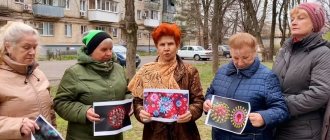ST 205.2 of the Criminal Code of the Russian Federation.
1. Public calls for terrorist activities, public justification of terrorism or propaganda of terrorism -
shall be punishable by a fine in the amount of one hundred thousand to five hundred thousand rubles, or in the amount of the wages or other income of the convicted person for a period of up to three years, or by imprisonment for a term of two to five years.
2. The same acts committed using the media or electronic or information and telecommunication networks, including the Internet, -
shall be punishable by a fine in the amount of three hundred thousand to one million rubles or in the amount of the wages or other income of the convicted person for a period of three to five years, or by imprisonment for a term of five to seven years with deprivation of the right to hold certain positions or engage in certain activities for a term of up to five years.
Note.
Lost power.
Notes. 1. In this article, public justification of terrorism is understood as a public statement recognizing the ideology and practice of terrorism as correct, in need of support and imitation.
1.1. In this article, the propaganda of terrorism is understood as the activity of disseminating materials and (or) information aimed at forming in a person the ideology of terrorism, the conviction of its attractiveness, or the idea that it is permissible to carry out terrorist activities.
2. In this article, terrorist activity is understood as the commission of at least one of the crimes provided for in Articles 205 - 206, 208, 211, 220, 221, 277, 278, 279, 360, 361 of this Code.
Commentary to Art. 205.2 of the Criminal Code
1. The objective side of the crime is characterized by alternatively provided actions: a) public calls for terrorist activities, i.e. public statements aimed at encouraging people to commit at least one of the crimes specified in Appendix 2 to the article; b) public justification of terrorism as an ideology (note 1 to the article and note 1 to article 205.4 of the Criminal Code).
2. The crime is completed from the moment the relevant actions are committed.
3. Unlike incitement to terrorist activity, this crime is committed against an individually indefinite number of persons.
4. The qualified crime (Part 2) involves its commission using the media or electronic or information and telecommunication networks.
Precedents in judicial practice
One of the real cases of calling for terrorism in Russia is the case of journalist Svetlana Prokopyeva. At one time, the journalist was active in the Pskov region and was a correspondent for Radio Liberty.
In 2022, Svetlana conducted a radio broadcast in which she read her text with reflections on the topic of undermining the young guy Mikhail Zhlobitsky. The girl connected the incident with the problems of the socio-political situation in the country. The next day the text was released under the title “Repression for the State.” Rospotrebnadzor almost immediately blocked all records.
In 2022, a criminal case was opened against Svetlana. The main reason is to justify terrorism. On September 20, 2019, the journalist was formally charged. In July, the girl was added to the list of extremists and terrorists. At the same time, Sberbank froze all the girl’s accounts.
In 2022, the prosecutor of Meleshchenya requested 6 years in prison for the journalist. The court found Svetlana guilty. She was given a fine of 500 thousand rubles.
At the same time, journalists expressed concern that now all media workers are under threat. The court's decision caused many rallies.
Case of Yuri Khovansky
Another high-profile incident occurred with comedian and blogger Khovansky. The case is relatively “fresh” for 2022. The reason for the investigation was a stream where a public figure performed a compromising song. Its text became the basis for bringing charges under the article calling for and justifying terrorism.
The compositions mentioned Chechen militants, as well as the terrorist attack that occurred on Dubrovka in 2002. Yuri performed the song on Andrey Nifedov’s stream at an unspecified time. According to the conclusion of the Investigative Committee - no earlier than 2022, according to eyewitnesses - in the period from 2011 to 2014.
The blogger apologized, which did not change the situation. On June 9, the court will consider the issue of a preventive measure. The main accusation against the blogger is a public call for terrorism.
According to the article, Yuri faces a fine of 300 thousand to 1 million rubles. An alternative punishment is imprisonment for a period of 5 to 7 years. Along with Yuri, Andrei Nifedov and Dmitry Larin were brought into the case as witnesses.
At the moment, Khovansky has been arrested for 2 months and will serve this term in a pre-trial detention center until a court hearing, which will take place on August 8.
Second commentary to Art. 205.2 of the Criminal Code of the Russian Federation
1. The objective side is characterized by three alternative actions: a) public calls for terrorist activities;
b) public justification of terrorism; c) public propaganda of terrorism.
In the commented article, terrorist activity is understood as the commission of at least one of the crimes provided for in Articles 205-206, 208, 211, 220, 221, 277, 278, 279, 360, 361 of the Criminal Code.
Appeals are an appeal for the purpose of inciting a desire to carry out terrorist activities among a part of the population. According to the direct instructions of the law, they must be of a public nature, i.e. committed in the presence of at least two persons (at meetings, rallies, etc.). The form of influence can be different: oral, written, audio and video recordings, posters, leaflets, etc.
The interpretation of public justification of terrorism or public propaganda of terrorism is contained in the note to Art. 205.2.
Public calls for terrorist activities should be considered a completed crime from the moment of public proclamation (dissemination) of at least one appeal, regardless of whether it was possible to induce other citizens to carry out terrorist activities or not. Public justification of terrorism constitutes a completed crime from the moment a person makes a public speech in which he declares recognition of the ideology and practice of terrorism as correct and worthy of support and imitation.
2. The subjective side is characterized by direct intent.
3. The subject of the crime is a person who has reached the age of 16 years.
4. Part 2 of the commented article provides for increased liability for public calls for terrorist activities or public justification of terrorism committed using the media or electronic or information and telecommunication networks, including the Internet.
Definition of terrorism in Russian legislation in 2022
The law “on countering terrorism” states that terrorism is an ideology of violence. It is carried out at 2 levels: call and action. Even at the legislative level, calling to commit an act of violence is considered illegal. This situation does not conflict with the rights to freedom of speech.
In the legal field, the desire to create a field for violence is a crime. How and who conducts the campaign is also important. The more influential the person, the manipulations and the methods of calling, the more serious the crime itself.
Why is the call dangerous?
- it creates the conditions for violence;
- manipulation occurs among those who have a weak psyche or easy suggestibility;
- malicious intent exists for a long time.
From the outside it may seem that the call has no basis in crime, but a person who systematically creates agitation for violence has a long-term malicious intent.
Terrorism also implies gaining control, for example, over power. Terrorists, using people and threats of murder, get what they want - certain benefits for their goals.
Terrorism is often disguised as supposedly ideological goals, such as protecting religion or the rights of one's people, although in reality ideology serves as another means of skillful manipulation.
Third commentary to Article 205.2 of the Criminal Code of the Russian Federation
The public danger of crime is associated with the spread of the ideology of terrorism as such, which justifies terrorism as a method of combating political and other opponents. It is necessary to take into account the explanations of the Plenum of the Supreme Court of the Russian Federation, given in Resolution No. 1 of 02/09/2012 “On some issues of judicial practice in criminal cases involving crimes of a terrorist nature.”
1. The object of the crime is public safety, as well as the safety of the institutions of society and the state, since the focus of the acts is related to the inculcation of the ideology of terrorism in society, and terrorism itself is the practice of implementing this ideology in acts that pose a danger to the individual, society and the state.
The objective side is characterized by two types of acts: public calls for terrorist activities; public justification of terrorism. Appeals are one of the forms of influence on the consciousness, will and behavior of people. Their goal is to unite citizens and activate their will towards the direct implementation of terrorist activities. At the same time, calls cannot be equated with incitement. Unlike incitement, calls are of a general nature and are not addressed to anyone personally. Publicity is recognized in cases where appeals are open, understandable and addressed not to just one, but to a wide range of people. The recognition of whether the circle of citizens is wide is of an evaluative nature and is decided by the court taking into account all the circumstances of the case: place, time, circumstances of the crime. This issue, as explained by the Plenum of the Supreme Court of the Russian Federation, must be resolved by the courts taking into account all the materials of the case (addressing a group of people in public places, on the Internet, on websites, forums or blogs, by sending electronic messages). The crime is considered completed from the moment the public calls are made and is not associated with the achievement of specific consequences: whether they achieved their goal of influencing citizens or not. At the same time, the form of appeals can be different: oral, written, using technical means (loudspeakers, microphones, etc.), if they are not an attribute of the media. A public justification of terrorism (see note to the article) is a public statement recognizing the ideology and practice of terrorism as correct, in need of support and imitation.
Part 2 Art. 205.2 provides for qualified personnel, i.e. committing this crime using the media (periodicals, radio, television, etc.), which entails a more severe punishment.
2. The subjective side is characterized by guilt in the form of direct intent, i.e.
the person is aware of the socially dangerous nature of public calls for terrorist activities or public justification of terrorism and wishes to commit these actions. Motives can be very different: hatred of government institutions, nationalist, religious, or other extremist motives, etc. Without affecting the qualifications, they can be taken into account by the court when assessing the degree of social danger of the crime, characterizing the personality of the perpetrator, as well as assigning punishment. The subject is any sane person who has reached the age of 16. ‹Article 205.1. Promotion of terrorist activitiesTop Article 205.3. Completing training for the purpose of carrying out terrorist activities ›
How Russia fights terrorism
The first serious anti-terrorism law was passed in 1998. The federal anti-terrorism law laid the foundation for the fight against violence. It spells out the basic rights and responsibilities of citizens. In 2006, the law “on countering terrorism” was approved. It included provisions on what measures should be taken to prevent an act of violence.
Expert opinion
Aleksandr Vladimirovich
Head of the Department of Civil Law, Doctor of Law, Professor
Expert consultation
When it comes to inciting violence, we need to understand why incitement is tantamount to a more serious crime. Typically, campaigning is carried out by persons who commit several crimes.
Terrorism on a scale that will instill fear requires people. Attracting them only seems like a harmless process. Propaganda includes distortion of facts and substitution of true moral values. After the so-called brainwashing, a person does not see the real picture of the world.
There is a separate article on campaigning and provisions related to its conduct - 205.2 of the Criminal Code of Russia. It covers all the nuances of a public call to carry out terrorist activities. The article also provides for punishment for those who justify terrorism and thus distort reality.



